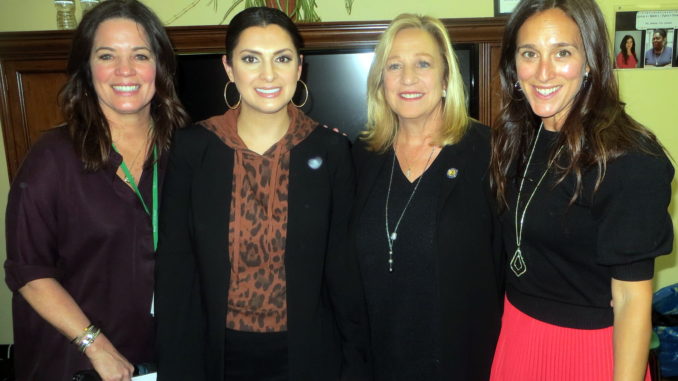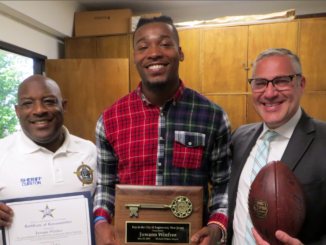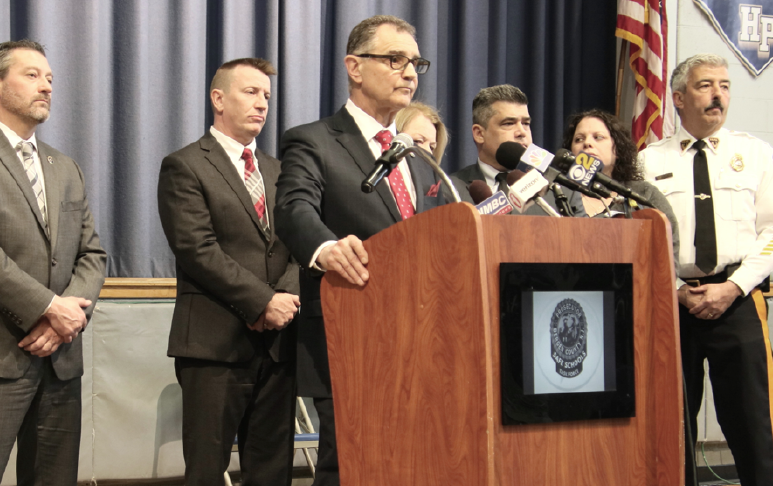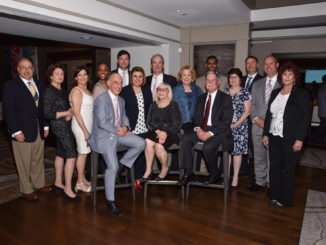
ENGLEWOOD, N.J.—A forum held Jan. 15 at the Bergen Family Center empanelled women leaders to discuss human sex trafficking, described as a growing crisis fueling a $150 billion worldwide criminal enterprise.
“Traditionally, everyone always thought that sex trafficking only occurred in foreign countries, where handcuffed women were smuggled into brothels. But, in 2015, I had an eye-opening experience,” said moderator Liz Corsini, Bergen Family Center vice president.
“After hosting an assembly at Dwight Morrow High School about sex trafficking, a female student told me that she had been approached at Ben and Jerry’s Ice Cream store in Englewood by a ‘well-dressed’ man inviting her to a photo shoot. He took her phone number and contacted her repeatedly,” Corsini said.
“The FBI later confirmed that he fit the description and tactics of a notorious sex trafficker,” Corsini said. “For years since, we have received countless reports from students who have been solicited on-line and in person right here in Englewood and surrounding towns. So, I realized that sex trafficking is taking place in our own backyard!”
The “Sex Trafficking: In Our Back Yard” forum brought awareness to the alarming fact that victims—often as young as 12 years old—are bought, sold and trafficked for sexual purposes, including in New Jersey.
According to the International Labor Organization, there are 4.5 million victims of sex trafficking across the world. In the U.S., nearly 9,000 cases of sex trafficking were reported to the National Human Trafficking Hotline and BeFree Textline, a 13% increase from the prior year, according to the Polaris Project. But, this data is incomplete, because cases are severely underreported.
Some of the biggest factors that lead vulnerable youngsters to sex trafficking are poverty, homelessness, mental illness, abuse at home, the foster system, and glamorization of the sex industry. They are often groomed by sexual predators, who may even be their friends and neighbors, by advertisements and by what they see on social media.
Panelist Lauren Hersh, who is the national director of World Without Exploitation, said it is critical that community leaders communicate warnings advising young people to be careful online, where she said the vast majority of sex recruiting is now taking place.
“At Dwight Morrow High School, four girls came to me and showed me their phones where they were being recruited by a trafficker on Instagram,” Hersh said.
Trafficking survivor Rebecca Bender is now an advocate and public speaker. She told the forum that her own horrific ordeal began with a broken family, then being manipulated by a con artist who thrust her into a life of violent physical and mental abuse. She was shuttled to multiple buyers by three traffickers in Las Vegas, branded on her back so she could be returned if she escaped. She fell into drug addiction, was arrested, and had her young child taken away from her.
Bender uses nonprofit advocacy to try and change the culture while helping train law enforcement and support survivors.
Englewood high school student Aaliyah Montgomery presented a report highlighting the racial and gender inequality among sex trafficking victims, saying black women and girls represent only 13% of the U.S. population but make up about 40% of sex trafficking victims.
State Assemblywoman Valerie Vainieri Huttle echoed the inequality, stating while males are infrequently convicted for procuring sex workers, victims are often jailed for prostitution.
“Another number that sticks in my mind is 12—because 12 is the average age of girls who are sex trafficked,” said Huttle. “So, we cannot address gender violence without addressing the racial and gender injustice that defines and feeds the sex trade.”
Can policies and legislation push back on the issue?
Anti-human trafficking efforts in New Jersey are bolstered by the New Jersey Coalition Against Human Trafficking and legislation such as the Human Trafficking Prevention, Protection and Treatment Act, which organized state law enforcement to respond to the crisis and initiate protective efforts.
Huttle championed the state law enacted in 2013, right before New Jersey hosted the Super Bowl in East Rutherford. The annual football game—this year set for Feb. 2 in Florida—is known to be a prime potential place for sex trafficking, said Huttle.
She is currently drafting a bill that follows the Equality Model, a five-pronged legal approach that addresses repealing current laws that call for arresting people in prostitution, providing trauma-informed services for those wishing to exit the sex trade, penalizing buyers, continuing to criminalize pimps, traffickers, brothel owners and illicit massage parlor owners and a commitment to community education.
State law also disseminates warning flyers now mandated in all public bathrooms around the New Jersey Turnpike. There is also a program gaining momentum called “Locker Slam,” which gives students magnets that contain messages from the New Jersey Coalition Against Human Trafficking to attach to their school lockers.
Corsini pointed out that combatting sex trafficking can’t be done just by women and she commended the many men in the audience for attending, and thanked Coach Barry Harris for the ongoing education he gives the Dwight Morrow High School athletes in proper behavior and attitudes towards young women.
“Here tonight are direct service providers, hospital social workers, police officers and middle and high school educators,” Corsini stated. “Many of these professionals work directly with young people who have many of the vulnerabilities that put local teens at risk for exploitation… We need to know about how to identify red flags [and] intervene when we suspect that a student has been exposed and/or exploited.”
Bari Lynne Schwartz, co-president of the National Coalition of Jewish Women Bergen County Section, said that their members are hanging flyers with tear-out tabs in public places advising girls who are approached improperly to contact the National Trafficking Hotline by calling 1-888-373-7888 or texting BeFree (233722).
By the close of the panel discussion at 8:30, Corsini realized that many more people wanted to be heard, so she announced that the dialogue would be continued that evening informally and also in follow up presentations.
The informative event emphasized the need to bring sex trafficking out of the shadows to create preventative awareness amongst communities.
“I hope everyone leaves here tonight inspired to get involved,” Corsini said.



